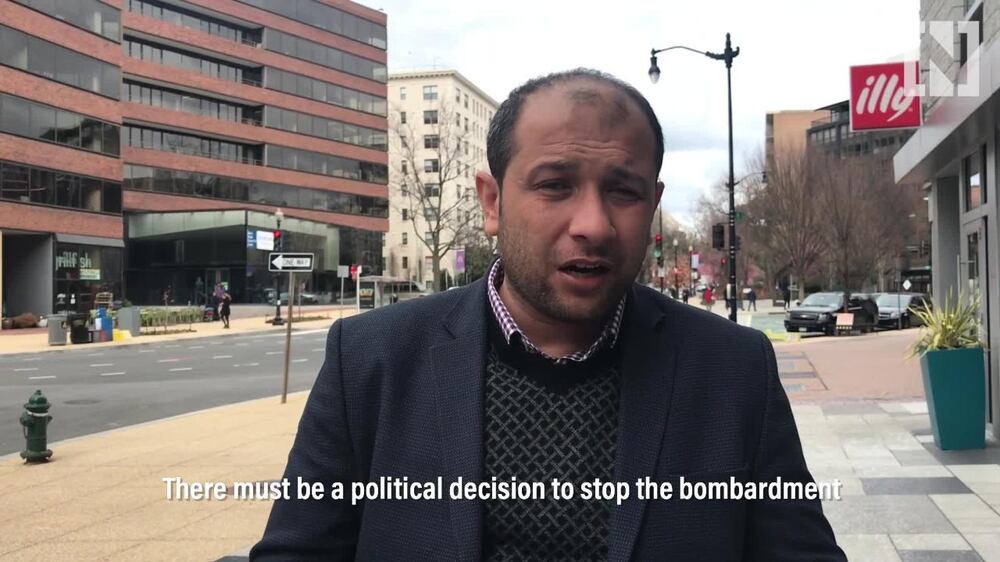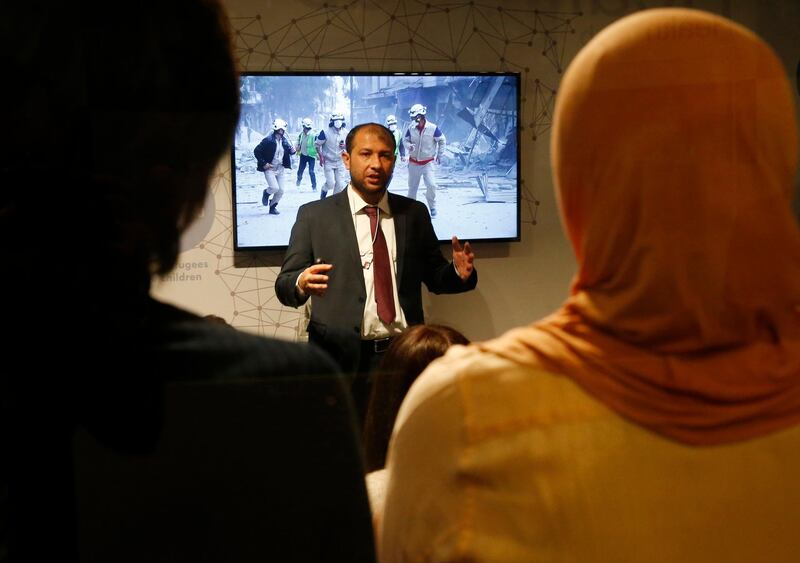The wearying impact of war is what first strikes you upon meeting the chief of the Syrian volunteer search and rescue organisation the White Helmets. Raed Saleh has run out of answers about the political paralysis that overshadows the Syrian war. But he is angry about the intensified bombing of Eastern Ghouta, a rebel-held enclave outside of Damascus, and the continuation of a conflict that has seen 11.5 per cent of the population killed or injured since 2011.
"The Syrians have tried all kind of deaths: by drowning, bombardment, shelling, beheadings, suffocation, barrel bombs, and chemical weapons", he tells The National in an interview during his short visit to Washington last week. After seven years of war, the 35-year-old former electronics salesman – who turned to humanitarian work after fighting broke out in his hometown of Jisr Shoughour – is now sounding the alarm on yet another unfolding tragedy.
The residents of Eastern Ghouta, an area located 16.8 kilometres east of Damascus, were already struggling to survive amid a five-year-long government siege. But three weeks ago they found their situation suddenly worse when the Syrian government – backed by Russia – launched a heavy bombing campaign on the enclave.
“The situation in East Ghouta has gone from bad to worse,” Mr Saleh said. “We have 390,000 people confined in an approximately 10 square kilometre area being bombarded by all kind of weapons including chlorine gas at times.”
At least three chemical weapons attacks have been reported by the Syrian American Medical Society Foundation in Eastern Ghouta since the start of the year.
_________
Read more:
[ Syria: Aid enters Eastern Ghouta as regime offensive continues ]
[ In eastern Ghouta rubble, a father looks for his son ]
[ Syrian government recaptures 'more than 25%' of Eastern Ghouta ]
_________
Mr Saleh said his organisation – officially known as the Syria Civil Defence – has 400 volunteers on the ground in Eastern Ghouta. But he described an increasingly unbearable situation for his team to operate in.
“Thirteen hospitals and five white helmets bases have been targeted by Russia and Assad in East Ghouta,” he said.
More than 670 civilians have been killed and over 2,000 injured since February 13, the White Helmets say. Asked why the Assad regime and Russian air force would deliberately target his team, Mr Saleh said: “It’s a question that haunts me. But in their criminal logic, this could be part of a military strategy for Russia and Assad – to inflict harm and prevent us from exposing crimes.”
The White Helmets chief said the situation in Eastern Ghouta was worse even than in rebel-held eastern Aleppo at the end of 2016 amid the government's successful campaign to retake the city.
“Aleppo was very tough, but East Ghouta is worse because we have more civilians in a small geographic location,” he said.
On February 26, Russia ordered a daily truce in the Damascus suburb between 9am and 2pm local time to allow for evacuations and for aid to get in. But Mr Saleh dismissed the so-called "humanitarian pauses" as “a farce”.
“What are people going to do in five hours? Who can let [in] the medication or aid in five hours?,” he asked.
He accused Russia of protecting Syrian President Bashar Al Assad and Iran – both on the ground and at the United Nations Security Council where Moscow has used its veto 15 times on resolutions condemning or sanctioning the government in Damascus.
_________
Read more:
[ White Helmets attacked by Russian-aligned online campaign ]
Editorial: 40,000 reasons to have hope in the power of compassion
_________
The White Helmets chief is concerned that Eastern Ghouta could see a repeat of the Aleppo outcome, whereby thousands in rebel-held areas in and around the second city fled to the neighbouring province of Idlib via so-called "humanitarian" corridors.
“I hope we don’t see a repeat of deadly corridors that Russia dubbed as 'humanitarian' but which were targeted by the regime in Aleppo,” he said, adding that such corridors amounted to "forced deportations".
"It is a population transfer and that is a war crime,” he said. Instead, Mr Saleh advocates for a ceasefire in Eastern Ghouta and an end to the siege.
Syrian White Helmets Chief speaks out

The White Helmets chief spoke as the United States is stepping up its efforts to achieve a ceasefire in Eastern Ghouta, with President Donald Trump calling the French, German, British and Egyptian leaders to discuss the issue in the last week. But Mr Saleh is not pinning his hopes on these efforts, or any kind of action by the Arab League, which has not yet called for an emergency meeting on Syria.
“We gave up on the Arab League long time ago,” he said, while adding that if the US wanted it could protect Eastern Ghouta. He cited a devastating counterattack that Washington launched in the eastern Syrian town of Deir Ezzour last month after US forces and their Syrian allies came under assault by hundreds of Russian mercenary fighters.
“When (former US President) Barack Obama threatened military action in 2013, Assad handed most of his chemical weapons. I am not convinced they’re (the US) unable. The same applies to Germany, and France.”
Asked about accusations levied by the regime that the White Helmets are tied to Al Qaeda, or by others that the organisation's volunteers are in fact Mossad and CIA agents, Mr Saleh said: “We are here to save Syrian civilians everywhere, we offer help where civilians need it – even in regime-controlled areas.”
Such accusations, he said, come from those “who don’t want to see civic organisations in Syria. [Our work] doesn’t fit their narrative, and we become enemy to them.”
Even if the war in Syria one day ends, Mr Saleh does not intend to return to his old job as an electronics salesman.
“I will use my expertise to help people return, to rebuild infrastructure, and ensure stabilisation," he said. "We have lot of work to do when that day comes."







